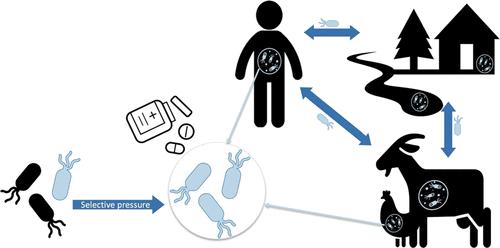当前位置:
X-MOL 学术
›
Environ. Sci. Technol.
›
论文详情
Our official English website, www.x-mol.net, welcomes your feedback! (Note: you will need to create a separate account there.)
Human Colonization with Antibiotic-Resistant Bacteria from Nonoccupational Exposure to Domesticated Animals in Low- and Middle-Income Countries: A Critical Review
Environmental Science & Technology ( IF 11.4 ) Pub Date : 2022-08-10 , DOI: 10.1021/acs.est.2c01494 Jenna M Swarthout 1 , Elana M G Chan 1 , Denise Garcia 2 , Maya L Nadimpalli 1, 3 , Amy J Pickering 1, 2, 3
Environmental Science & Technology ( IF 11.4 ) Pub Date : 2022-08-10 , DOI: 10.1021/acs.est.2c01494 Jenna M Swarthout 1 , Elana M G Chan 1 , Denise Garcia 2 , Maya L Nadimpalli 1, 3 , Amy J Pickering 1, 2, 3
Affiliation

|
Data on community-acquired antibiotic-resistant bacterial infections are particularly sparse in low- and middle-income countries (LMICs). Limited surveillance and oversight of antibiotic use in food-producing animals, inadequate access to safe drinking water, and insufficient sanitation and hygiene infrastructure in LMICs could exacerbate the risk of zoonotic antibiotic resistance transmission. This critical review compiles evidence of zoonotic exchange of antibiotic-resistant bacteria (ARB) or antibiotic resistance genes (ARGs) within households and backyard farms in LMICs, as well as assesses transmission mechanisms, risk factors, and environmental transmission pathways. Overall, substantial evidence exists for exchange of antibiotic resistance between domesticated animals and in-contact humans. Whole bacteria transmission and horizontal gene transfer between humans and animals were demonstrated within and between households and backyard farms. Further, we identified water, soil, and animal food products as environmental transmission pathways for exchange of ARB and ARGs between animals and humans, although directionality of transmission is poorly understood. Herein we propose study designs, methods, and topical considerations for priority incorporation into future One Health research to inform effective interventions and policies to disrupt zoonotic antibiotic resistance exchange in low-income communities.
中文翻译:

低收入和中等收入国家因非职业性接触家养动物而导致的耐抗生素细菌的人类定植:一项批判性回顾
在低收入和中等收入国家 (LMIC),有关社区获得性抗生素耐药性细菌感染的数据尤其稀少。中低收入国家对食用动物抗生素使用的监督和监督有限、安全饮用水供应不足以及环境卫生和个人卫生基础设施不足可能会加剧人畜共患抗生素耐药性传播的风险。这篇批判性综述汇集了 LMIC 家庭和后院农场内抗生素耐药细菌 (ARB) 或抗生素耐药基因 (ARG) 的人畜共患交换证据,并评估了传播机制、风险因素和环境传播途径。总的来说,有大量证据表明驯养动物和接触过的人类之间会交换抗生素耐药性。在家庭和后院农场内部和之间证明了人与动物之间的全细菌传播和水平基因转移。此外,我们将水、土壤和动物食品确定为动物和人类之间交换 ARB 和 ARG 的环境传播途径,尽管人们对传播的方向性知之甚少。在此,我们提出研究设计、方法和主题考虑,以便优先纳入未来的 One Health 研究,以告知有效的干预措施和政策,以破坏低收入社区的人畜共患抗生素耐药性交换。和动物食品作为动物和人类之间交换 ARB 和 ARG 的环境传播途径,尽管传播的方向性知之甚少。在此,我们提出研究设计、方法和主题考虑,以便优先纳入未来的 One Health 研究,以告知有效的干预措施和政策,以破坏低收入社区的人畜共患抗生素耐药性交换。和动物食品作为动物和人类之间交换 ARB 和 ARG 的环境传播途径,尽管传播的方向性知之甚少。在此,我们提出研究设计、方法和主题考虑,以便优先纳入未来的 One Health 研究,以告知有效的干预措施和政策,以破坏低收入社区的人畜共患抗生素耐药性交换。
更新日期:2022-08-10
中文翻译:

低收入和中等收入国家因非职业性接触家养动物而导致的耐抗生素细菌的人类定植:一项批判性回顾
在低收入和中等收入国家 (LMIC),有关社区获得性抗生素耐药性细菌感染的数据尤其稀少。中低收入国家对食用动物抗生素使用的监督和监督有限、安全饮用水供应不足以及环境卫生和个人卫生基础设施不足可能会加剧人畜共患抗生素耐药性传播的风险。这篇批判性综述汇集了 LMIC 家庭和后院农场内抗生素耐药细菌 (ARB) 或抗生素耐药基因 (ARG) 的人畜共患交换证据,并评估了传播机制、风险因素和环境传播途径。总的来说,有大量证据表明驯养动物和接触过的人类之间会交换抗生素耐药性。在家庭和后院农场内部和之间证明了人与动物之间的全细菌传播和水平基因转移。此外,我们将水、土壤和动物食品确定为动物和人类之间交换 ARB 和 ARG 的环境传播途径,尽管人们对传播的方向性知之甚少。在此,我们提出研究设计、方法和主题考虑,以便优先纳入未来的 One Health 研究,以告知有效的干预措施和政策,以破坏低收入社区的人畜共患抗生素耐药性交换。和动物食品作为动物和人类之间交换 ARB 和 ARG 的环境传播途径,尽管传播的方向性知之甚少。在此,我们提出研究设计、方法和主题考虑,以便优先纳入未来的 One Health 研究,以告知有效的干预措施和政策,以破坏低收入社区的人畜共患抗生素耐药性交换。和动物食品作为动物和人类之间交换 ARB 和 ARG 的环境传播途径,尽管传播的方向性知之甚少。在此,我们提出研究设计、方法和主题考虑,以便优先纳入未来的 One Health 研究,以告知有效的干预措施和政策,以破坏低收入社区的人畜共患抗生素耐药性交换。



























 京公网安备 11010802027423号
京公网安备 11010802027423号